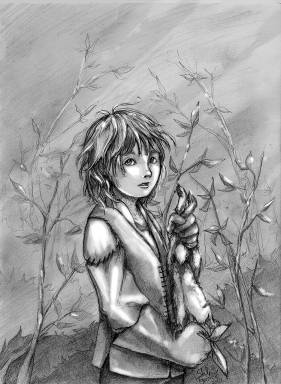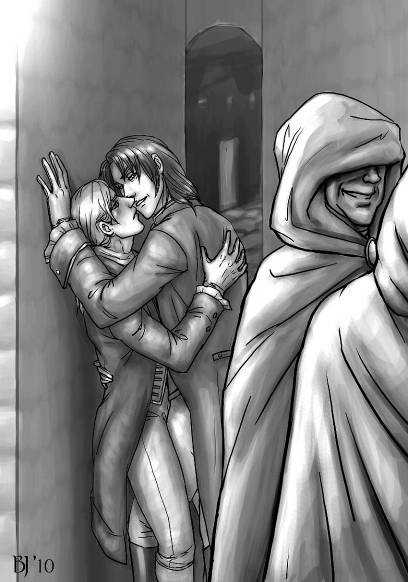Glimpses (9 page)
Authors: Lynn Flewelling
Tags: #alec, #collection, #erotica, #fantasy, #glimpses, #lynn flewelling, #nightrunner, #nightrunners, #scifi fantasy, #seregil, #short stories

“I’m going to marry you, Ireya,” he whispered
to her as they lay together one night. “You’re going to be my
wife.” He wove his fingers with hers. “Do you understand? Leave
with me?”
She looked down at him and their joined
hands, then laughed and kissed him. “My talí.”
By the time she left this time, he was well
enough to go out and watch her trudge away. Her snowshoes sank deep
in the glistening fresh powder and kicked up little puffs of it as
she disappeared up the slope toward a small pass between two jagged
peaks. There must be a town up there somewhere. Next time she went
back, he meant to go with her.
But when she came back again, she wouldn’t
hear of it. In fact, the subject quite clearly scared her. “No, no!
Kill you.”
“Ireya kill me?” he asked, certain he wasn’t
understanding her.
She shook her head, then took up the sharp
stick they used and drew a figure and pointed to herself. That was
her. Then she quickly scratched out four more the same size with
bows, and two larger ones. Pointing to the four, she told him,
“Mine. They kill!” and poked him in the chest with her finger.
Her people would kill him. For the first time
in weeks, he thought of all those stories he’d heard. Why had she
befriended him, if it went against the ways of her people?
“All right, then,” he sighed. “No go. You
leave with me when my arm is mended.”
She kissed him for that, but her eyes were
sad. He didn’t have the words to ask her why.
***
The bear came several more times that summer,
and Alec’s father hunted it but came back empty handed each time.
Winter came, and the bear went to sleep under the snow as it always
did. His father always seemed happier in the winter, even though
life was harder. They set their traps and sold the skins of the
muskrat, otter, mink and fisher in the towns.
But summer came again, and with it the
bear.
His father took Alec back to the Coney, where
the boy earned his keep sweeping and working in the garden and
stables for Carsi, the innkeeper. In return he was allowed to sleep
with her two young sons, who were a little older than he was, in
their little airless room under the eaves, where the mice rustled
through the thatch close overhead each night.
The boys, Ors and Olum, played with him when
he wasn’t busy. They went berrying in the forest meadows, and
fishing and swimming in the river. He enjoyed it, but began to
worry about his father. He’d never been gone this long before.
***
There was only one rider this year, the tall
leader Amasa had seen before. The Hâzadriëlfaie was a cagey man,
and it was clear he knew he was being stalked even as he stalked
Amasa.
When Amasa did find a safe place to sleep, he
dreamt of Ireya and what had happened that long ago spring. The
last time she came to him in that cave had been a few weeks after
the splint came off. They made love in the musky furs and then she
began to cry. When he begged her to tell him why, she took his hand
and placed it on her belly. The message was clear enough.
“Baby?” he asked, throat tight with emotion.
A child!
“Yes,” she whispered, weeping. “Kill. They
will kill!”
“Kill the baby?”
She nodded.
“Then you have to come away with me. Leave
with me!”
She rested her head on his broad chest and
nodded. “Leave with Amasa.”
But the next morning she was gone again.
He never knew if she’d changed her mind or
gotten caught going back for more supplies. It didn’t matter. He
was strong enough now to track her, and he did, all the way up a
side pass so narrow he could hardly squeeze through, to a huge
valley beyond. There were scattered stone cottages and farms all
the way up its length, to what looked like a town in the distance,
perhaps Fay Tast, as she’d said to him that first day. Looking down
from the heights, he could see riders and carts on roads, and when
he crept down through the forest for a closer look, he saw they all
wore the same blue-and-white head cloth—sen’gai, Ireya called
it.
He had no intention of being killed before he
found her, so he skulked for weeks like a wolf in the night and
finally caught sight of her in the yard of an isolated farmstead
not far from the narrow pass. He watched for days, but she was
never out of the cottage without an escort—brothers, most likely.
At night she slept in a room with iron bars on the window.
He crept to her window late one night and
scratched softly at the shutter. Her face appeared there an instant
later and the look she gave him was one of horror.
She reached out through the bars for his
hand. “Leave!” she whispered frantically.
“No. Not without you!”
“They kill you, Amasa. They kill me! You
leave!”
“I’ll kill them!”
Her hand tightened on his. “No, Amasa. No
kill mine!”
He could tell by her tone that she would
never forgive him if he killed her kin, even to help her. “Do they
know about me?”
“No,” she whispered. “They wait, to see the
baby.”
“To see if it’s Tír.” He’d learned that word,
the one that meant ‘outsider.’ “And when they do?”
“Leave,” she pleaded softly, but he could see
tears shining in her eyes as she turned away and closed the
shutters.
But Amasa didn’t. He came back night after
night, but her answer was always the same. The bars were set in
mortared stone. There was no getting her out that way, so he could
only skulk and keep watch and bide his time.
Never once was she allowed further than the
well, and not once alone. He’d come to recognize the four brothers,
and the parents who lived with them. As spring gave way to summer
Amasa narrowly evaded the brothers time and again and watched
Ireya’s belly grow round and heavy under her long tunics.
On a warm summer night the sound of a woman
crying out in pain drifted up the hill to where he sheltered in the
trees. Creeping down, he found too many people out in the yard to
get to the window, but as the cries continued, he guessed that his
child was being born, here, among his enemies. He sat in the tall
grass at the edge of the forest, keeping his lonely vigil among the
crickets and weeping for them both.
He was there when the sun came up, and saw
Ireya slip from the silent house with a tiny bundle in her arms.
Her feet were bare, her skirt bloody, her face a mask of
desperation. She was making in his direction and saw him when he
started down to meet her. She waved him back to the trees as she
ran through the meadow and up the slope toward him. She was nearly
to Amasa when her brothers came riding after her with bows.
Reaching him, Ireya thrust the swaddled
infant into his arms and gasped, “Leave! Leave, talí!”
And before he could stop her, she turned and
ran back the way she’d come, arms thrown wide, as if she could stop
the arrows from finding him. Amasa watched in horror as she fell,
then turned and bolted for the narrow pass. All he could see of the
tiny babe in the swaddling was a red little face and eyes as blue
as his own.
***
Amasa tracked his Hâzadriëlfaie hunter that
summer, and his hunter tracked him. It was only a matter of time
until one of them won the contest.
The Maker must have known Amasa’s sorrow and
taken pity on him. It was the month of Ireya’s murder when, one
morning just before dawn, he met his pursuer face to face. Amasa
was not helpless and unarmed today, as he had been seven years
ago.
The Hâzadriëlfaie man was mounted, and
couldn’t get his bow up in time before Amasa shot him through the
lungs. Slumping over his horse’s neck, the man kicked the beast
into a gallop and tried to escape through the trees.
The blood trail was easily followed for a
tracker like Amasa. He found a bloody bow on the ground at
midmorning, and a discarded pack soon after. Just as the sun tipped
down from noon, he found the man dying on the ground in a small
clearing, horse nowhere in sight.
Bow drawn, Amasa came closer. The man eyed
him calmly, though he must have known he was looking at his own
death. “You do not understand what you do,” he whispered with the
same accent Ireya had had. His lips were foamed pink with lung
blood, his chin crusted with it. “The child—” More blood bubbled
from the corner of his mouth as he tried to speak. “Cannot be—”
“The child is,” Amasa growled.
“More will come—”
Pain and hatred and old, old sorrow boiled in
Amasa’s heart as he spat in the man’s face, pulled his head back by
the hair, and slit his throat.
The rest of the day passed in a strange sort
of fog, but when it cleared in the late afternoon he was covered in
blood and a hide very much like a bear’s was nailed to a large
tree, scrapped and brain-tanned. The skinned carcass hung by its
heels from another tree, gathering flies.

Let those who would come see that.
***
Alec was sweeping out the stable yard when
his father appeared at the gate, dressed in new clothing and
thinner than the boy had ever seen him. He had a string of fox and
mink pelts on his belt.
“Papa!” Alec cried happily, running to him.
“Did the bear get away again?”
“Not this time, child.”
“You killed it! Where’s the skin? How much
can we sell it for?”
“It was no use for selling,” his father
replied. Kneeling in front of him, he held Alec by the shoulders
for a moment and gazed down at him with an expression of such
fondness as Alec had never seen before. Then he saw the tears in
his father’s eyes.
“What is it, Papa? What’s wrong?” he asked,
alarmed.
His father smiled. “Nothing, Alec. Not a
thing. Go gather your things. We have traps to set.”


Seregil leaned over the riverbank and
examined the welt swelling across his left cheekbone. Angry eyes
glared back up at him through the red and yellow leaves drifting
past on the current: You’ve failed again. Failed at court. Failed
at wizardry. Failed at the assassin’s craft, failed in your own
birthright...Blood on your hands, but you can’t even make a
dishonest living.
He dipped his left hand in the water,
blotting out that accusing stare, and held it to his sore cheek.
The old saying was right: hunger was a harsh master and a poor
guide. It had been stupid, trying to pick the purse of a merchant
in a rat hole river town full of thieves, worse even than trying to
cheat those sailors at Isil two days earlier. They’d proven a good
deal more clever than they’d looked, and taken everything he
had—horse, sword, money, cloak, boots—before beating him senseless
and dumping him on a garbage heap outside the town walls.
